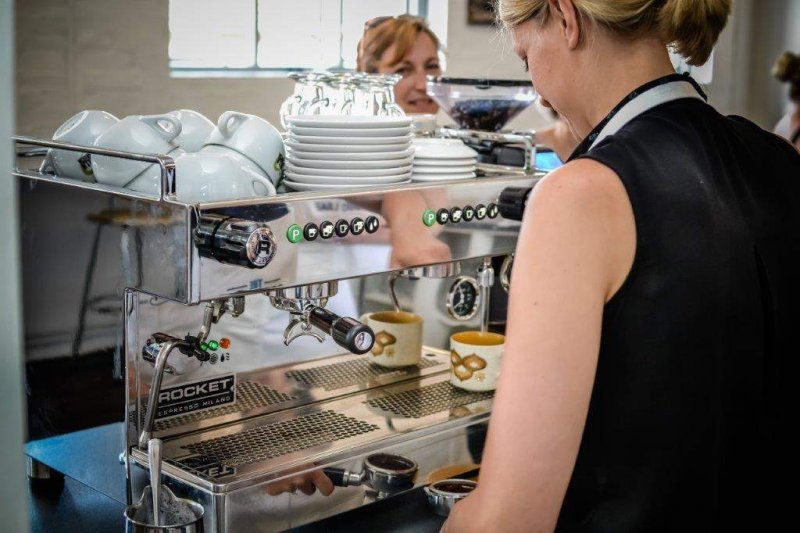
Nestled between BBC Northampton and a quadruple-fronted Jobcentre sits the Northampton Boot and Shoe Quarter. Surrounded by neatly stacked rows of red-bricked terraces and boarded up shoe factories, it’s hard to imagine that trade was once booming here.
Wandering past the graffiti-smothered shop windows, I approach my destination. Once home to an RAF boots factory, the building has been turned into an artisan bakery and café. But unlike most fiver-a-sourdough-loaf establishments, The Good Loaf is staffed by female ex-offenders.

All photos: The Good Loaf
Inside I am greeted with row upon row of cake and loaf upon loaf of bread. Behind the counter, women busy themselves with raucous coffee machines and chattering customers. On the surface, it looks no different from any other café. And apart from the odd prison tattoo on show, it isn’t. “It’s just a normal place,” explains Mike Crisp, the Bakery’s operations manager. “Often it’s only afterwards that people realise they’ve been served by an ex-prisoner”.
Having been a baker for nearly 30 years, Crisp starts work at four in the morning and oversees the day-to-day running of the kitchen. “The volunteers have to be able to put up with banter from the baker. It’s a real life working situation,” explains Crisp. “Some of the women have never had men around them that don’t want to take something from them”.

Since opening last July, The Good Loaf has helped improve the lives of local women who have either been in prison, on probation or in long-term unemployment. In helping women who have come into contact with the criminal justice system, it has not only increased the employability of female offenders but helped break cycles of offending and removed the stigma that ex-offenders face.
Julie*, 44, has been involved since January. “I started as a volunteer but now I’m full-time paid staff. I love coming here. I bake all the cakes; everything from coffee cake to carrot cake to brownies. More recently I’ve been experimenting with Rolo and Reese’s cakes,” she says.

Charged for assaulting a police officer, Julie was put on probation for 12 months instead of receiving a prison sentence. “It was a stupid drunken mistake and I haven’t drunk anything since,” she tells me. “I’m now working as a team leader in the kitchen. This is the first job I’ve ever worked. Before this, I was a carer for my disabled child. I’m really enjoying having a routine and interacting with the other staff and customers.”
Unlike Julie, her fellow volunteer Hannah* hasn’t had a run-in with the law. “I’m recovering from alcoholism. If it wasn’t for the church and my friends, I probably wouldn’t be here now,” she reflects. “I haven’t had a paid job for two years so coming here has really helped me. It gives you a purpose – something to stay on the straight and narrow for. If you’ve got to go to work in the morning, you’re not going to stay out the whole night before.”

Julie and Hannah are not alone. The Good Loaf supports up to 100 women each year. As well as offering employment and training opportunities in a real working environment, it directly feeds its volunteers into other jobs in Northampton. “Businesses in the local community have been very supportive. Obviously it can be a risk taking on an ex-offender, so we feel that we need to lead by example,” explains The Good Loaf’s CEO, Suzy Van Rooyen.
Without places like The Good Loaf, local businesses would continue to cast off applicants with a criminal record in a discarded pile. After all, the employment prospects for women leaving prison are gloomy. A mere 8 per cent of women are likely to have positive employment outcomes when released, compared with 27 per cent of men.
Taking many of its volunteers from Peterborough Prison, The Good Loaf takes a holistic approach. As well as providing employment opportunities, it also has a domestic abuse practitioner and mental health worker on site. “We support them with all of their different needs. It’s amazing to hear some of the women say ‘this is the first time I’ve done something for myself’,” Rooyen says. “Positive feedback from the customers definitely helps build confidence too.”

It’s worth noting that 80 per cent of women who enter prison under sentence have committed a non-violent offence. In other words, the majority of female offenders serve short sentences for low-level petty crimes like shoplifting. But these short sentences are not to be underestimated – not only does prison disrupt maternal bonds (two-thirds of female prisoners have a child under five) irreparably; it later leaves women with the practical problem and social stigma of a criminal record.
Moreover, female prisoners are a deeply troubled demographic. According to stats from the Prison Reform Trust, not only have half of women in prison experienced domestic violence, 53 per cent suffered abuse while they were children. On top of this, mental health problems are also prevalent. To put this into context, almost a third of female inmates had a psychiatric admission prior to entering prison.
This is why places like The Good Loaf are so important. In helping women integrate into what is often a hostile and unforgiving society, The Good Loaf helps to break cycles of crime, violence and hopelessness.
*The names of Julie and Hannah have been changed to protect their identity.






